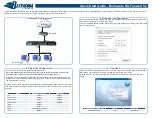
Spanning Tree Protocol
CONFIGURE > NETWORK CONNECTIONS > Network Interfaces > Select the tar-
get interface
Spanning Tree Protocol (STP) allows Operation Manager devices to discover and
eliminate loops in network bridge links, preventing broadcast radiation and allow-
ing redundancy.
When STP is implemented on switches to monitor the network topology, every link
between switches, and in particular redundant links, are cataloged. The spanning-
tree algorithm blocks forwarding on redundant links by setting up one preferred link
between switches in the LAN. This preferred link is used for all Ethernet frames
unless it fails, in which case a non-preferred redundant link is enabled.
Note: STP Limitations
If multiple bridges are created on the same switch they should not be used on
the same network segment as they have the same MAC addresses, therefore
STP will likely not work correctly as they will have the same bridge id.
Rapid Spanning Tree Protocol (RSTP), Multiple Spanning Tree Protocol
(MSTP) and other proprietary protocols are not supported.
The bridge settings relating to STP cannot be changed from the default values
shown below:
group_address
forward_delay (default is 15)
hello_time (default is 2)
max_age (default is 20)
priority (default is 32768 (0x8000))
Enable STP in a Bridge
To enable STP you can use the UI or CLI. The procedures are:
CONFIGURE MENU
63
Summary of Contents for OM1200 Series
Page 1: ...Operations Manager User Guide 20 Q4 November 2020 ...
Page 34: ...ACCESS MENU 34 ...
Page 39: ...l Logging Levels l Serial Port Aliases CONFIGURE MENU 39 ...
Page 93: ...CONFIGURE MENU 93 ...
Page 154: ...Note Double quotes around strings should be protected from the shell ADVANCED OPTIONS 154 ...
Page 162: ...UI BUTTON DEFINITIONS 162 ...
















































